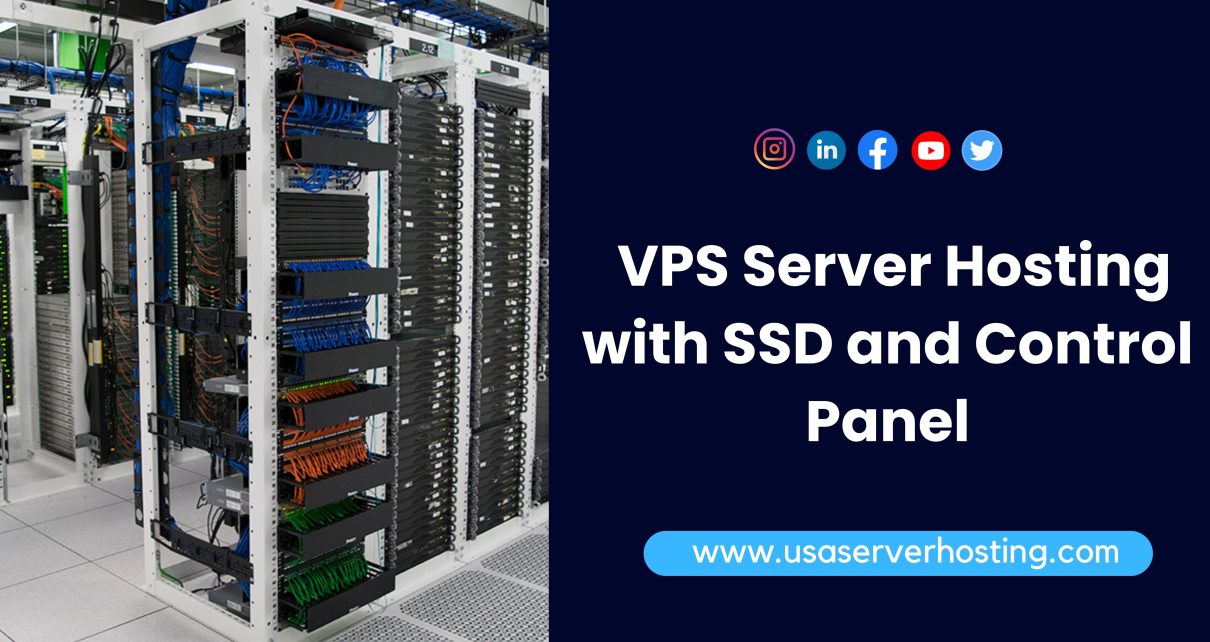When it comes to hosting your website, you might be tempted to choose a cheaper option. After all, it makes more sense to save money by using a virtual private server host. While this might be a reasonable assumption, it’s not always the best decision. There are many good reasons to choose a Linux VPS Server over a cheaper host. This blog post will explore some benefits of using SSD storage on VPS servers and how you can utilize this functionality. We will also provide a step-by-step guide on setting up and using a control panel for your VPS server.
What are SSD and Control Panel?
SSD stands for Solid State Drive. It is a storage device that uses flash memory instead of traditional hard drives. SSD is faster and more reliable than conventional hard drives, making them a popular server hosting choice because they provide faster performance and fewer crashes.
Server administrators can configure their VPS server with an SSD to improve performance. The best way to do this is through the control panel, which provides detailed information about the individual devices on your server and how they are configured. You can also use the control panel to change your VPS settings, such as your operating system’s frequency, processor type, and graphics card.
If you’re considering upgrading your VPS server to an SSD, consult your control panel first to see if it’s possible and what steps need to be taken.
How does VPS server hosting with SSD and Control Panel benefit the user?
SSD provides faster performance for your web server. When you have a speedy SSD, your server responds quickly to requests from the web browser. This results in better browsing experiences and fewer page load times. Additionally, having a fast SSD will help to keep your server cooler and reduce the chances of system crashes.
You can also improve the reliability of your VPS hosting with a control panel that uses SSD storage. You can ensure that all data is stored on an ultra-fast drive using a control panel that utilizes SSD storage. It will be much easier to fix if your disk has an issue since all your data will be on one drive instead of spreading across several disks. In addition, if you use a control panel that utilizes SSD storage, you can optimize your hosting environment for performance and reliability. Overall, using VPS hosting with SSD and Control Panel means improved performance and reliability for both the user and the service provider!
What are the Different Types of SSD in a VPS Server Hosting?
SSD technology has continued to make considerable strides in recent years, and it is now commonplace for many VPS servers to be equipped with SSD as their primary storage medium. Various types of SSD are available on the market, each with its advantages and disadvantages. This article will discuss the different types of SSD and their respective benefits and drawbacks when using them in a VPS server hosting environment.
The three main types of SSD used in VPS server is traditional spinning disks, synthetic spinning disks, and memory-based solid-state drives.
Traditional spinning disks are the oldest type of SSD, and they operate much as regular hard drives do. They use a metal platter that stores data and rotation speeds that vary depending on the size of the disk. When you create or edit a file on an HDD, the operating system reads the data from the disk into RAM before writing it back to the disk. Because HDD is slow compared to other storage technologies, they are generally not recommended for use in VPS servers.
How to Build to Linux
You can use a traditional hard drive or an SSD if you want to run a VPS server on Linux. An SSD offers many benefits over a conventional hard drive, including faster boot times, lower latency, and higher read/write speeds. In this article, we’ll show you how to set up your own VPS with an SSD and the control panel Virtual Server Manager. First, we’ll install the necessary packages. Then, we’ll create a new VPS with an SSD using the control panel. We’ll also show you how to access and manage your VPS from anywhere using the Virtual Server Manager control panel.
How Does SSD Work on a VPS Server?
SSD technology is becoming increasingly popular in VPS Server hosting due to its many benefits. When you build a VPS, you have two options for storage: spinning disks or SSD. A spinning disk is like an HDD in your computer. It has a large capacity but limits your ability to access data quickly. An SSD, on the other hand, is like a flash drive – it’s quick to access but has relatively limited capacity. Here we’ll look at how SSD works on a VPS and how it can improve your hosting experience.
SSD is especially suited for VPS hosting because it offers high performance and allows you to move files between your computer and the server quickly. You can run applications and programs faster than a traditional server without sacrificing data storage space.
What Type of Applications Can be Hosted on a VPS Server?
What type of applications can be housed on a VPS server? There are many different types of applications that can be hosted on a VPS server. Some popular applications that can be hosted on a VPS include:
1 – The VPS server is perfect for hosting web applications. Web applications are typically small, making them ideal for hosting on a VPS server.
2 – A VPS server is also great for hosting business applications. Business applications typically require more resources than web applications, making them better suited for hosting on a VPS server.
3 – This server is also great for hosting game servers. Game servers often require more resources than other servers, making them perfect for hosting on a VPS server.
What is an SSD?
SSD stands for Solid State Drive. An SSD is a hard drive that uses flash memory instead of a spinning disk to store data. This makes an SSD faster and more reliable than a regular hard drive. One significant advantage of using an SSD as your server’s primary storage. That it can significantly speed up the loading time of web pages and other applications. This is because an SSD contains no moving parts. Meaning that data can be read and written much faster than a regular hard drive.
What is a Control Panel?
A control panel is a user-friendly interface that allows you to manage your VPS server. This can include setting up and managing your server’s operating system, applications, storage, and networking. Control panels also allow you to create and manage user accounts and configure security settings.
How do SSD and Control Panel Benefits the VPS Server Hosting Process?
SSD is quickly becoming the go-to storage medium for hosting servers. Its fast read and write speeds make it ideal for storing data. That needs to be accessed frequently, such as website files or logs. This means that SSD can improve the performance of a VPS server hosting process by allowing quicker data access. SSD in a VPS server hosting environment can also improve control panel navigation. Since the storage media is located on the same physical device as the computer. Using an SSD improves responsiveness. when using control panels like Windows Server 2016 Hyper-V Manager and Firmware Sphere. In addition, an SSD can also help reduce boot time and overall system load times. Making it easier to manage and monitor systems from a control panel interface.




